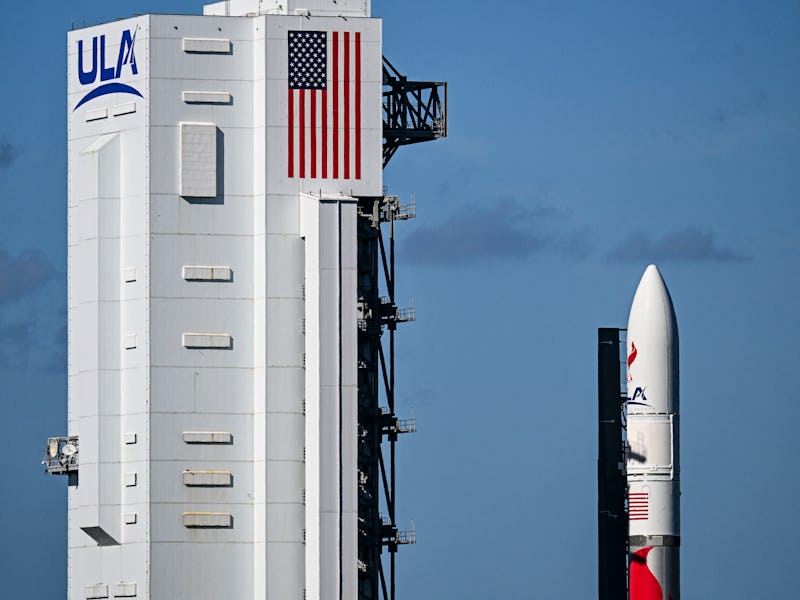SpaceX Competitor, ULA, Set To Launch Monday And Carry First U.S. Moon Lander Since Apollo
The first American lander to reach the Moon since Apollo is days away from launch.

In the predawn hours of Monday, January 8, two new projects aim to take flight. Private space company United Launch Alliance will see the inaugural flight of its Vulcan Centaur rocket. Onboard the Vulcan Centaur is Astrobotic’s Peregrine I lander, which will attempt to land on the Moon and, among other tasks, explore the lunar surface, paving the way for future landings and experiments. If all goes well, this will mark the first time the United States has landed a spacecraft on the Moon in more than 50 years.
The duo’s successes would also trigger significant changes to modern space exploration, allowing NASA to make more frequent trips to the Moon and usher in more competition in the commercial launch-vehicle sector. Here’s what you need to know.
United Launch Alliance’s Vulcan Centaur will take its first flight
United Launch Alliance (ULA), a partnership between Boeing and Lockheed Martin, is flying its new Vulcan Centaur rocket for the first time. If this flight, called Cert-1, goes well, and if subsequent orbital testing delivers good results, ULA will be well on its way to compete with reusable, low-cost, commercial-spaceflight leader SpaceX.
Vulcan Centaur, whose flight window opens on Monday at 2:18 a.m. Eastern from Cape Canaveral, Florida, must fly one more certification flight to be fully accredited by the Space Force, according to Gary Wentz, vice president of ULA’s government and commercial Programs, who spoke during a NASA conference call with the media on January 5.
Vulcan Centaur has been in the works for 10 years, and it may take a bit more time before it could overtake SpaceX. Vulcan Centaur’s boosters are, unlike SpaceX, not yet reusable. Wentz said, however, that a concept for a reusable one is in development.
The new rocket does offer the ability to carry more than one mission into space. According to a SpaceNews report published on November 17, ULA is aiming to launch Centaur Vulcan twice a month by the end of 2025.
Astrobotic’s Peregrine I will become the first private spacecraft to land on the Moon
Not since Apollo 17 in 1972 has the United States landed on the Moon. That will change with the rocket’s primary payload, Astrobotic’s Peregrine I lander. During Friday’s conference call, CEO John Thornton called the mission “terrifying,” “nail-biting” and “exciting.”
NASA paid Pittsburgh-based company Astrobotic $108 million to fly its science payloads to the lunar surface. This is the first flight of NASA’s Commercial Lunar Payload Services (CLPS), an initiative that could make the Moon a less expensive, more frequent destination for small-sized science instruments. These would collect data to bolster the space agency’s ambitious Artemis program, which might send the first humans to the Moon since Apollo as early as November 2024.
Following a trans-lunar injection after launch, Astrobotic’s Peregrine I will enter into lunar orbit, waiting for the perfect landing opportunity on February 23rd, when a NASA-selected, science-rich landing site on the Moon’s nearside experiences local lunar sunrise.
Five NASA payloads will look for subsurface water, observe particles floating in the outermost edge of the Moon’s gravitational influence, and more.
Onboard the ULA rocket and Peregrine are two sets of packages from memorial company Celestis. Their Tranquility Mission to the Moon and the Enterprise Mission out to deep space contain personal messages and the ashes of several people. These include those of Star Trek actress Nichelle Nichols and science-fiction screenwriter Gene Roddenberry, among others. However, Astrobotic and ULA have come under recent criticism from the Navajo community and others, who make the case that the Moon is an inappropriate burial ground.
“Our goal at Astrobotic is to make space accessible to the world… we have tried to do the right thing… I’m disappointed that this conversation came up so late in the game… we really are trying to do the right thing,” Thornton replied when asked on Friday about the controversy.